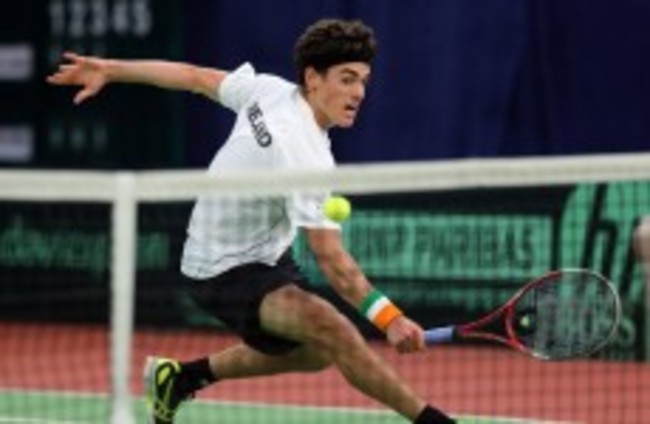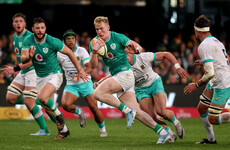YOU’RE IRELAND’S NUMBER one ranked tennis player; you’ve practised with Rafael Nadal, Lleyton Hewitt and Marin Čilić; and have risen a whopping 218 places in the ATP rankings in just 18 months.
Glamorous, right? Well, the life of a professional tennis player has been anything but for Castleknock native, James McGee — who is currently ranked 231 in the world.
The 26-year-old hopes to break into the top 100 in the coming years, having turned professional five years ago. However, without lucrative sponsorship, it’s been a lonely crusade on the draining Futures and Challengers circuit in desolate tennis locations across the world.
Indeed, such is the disparity in tennis, the world no.231 in golf, JJ Henry, has amassed a career haul of $13,815,052 and has already made $262,276 in 2014 alone. In contrast, McGee has earned just $102,012 in prize money in a six-year professional career
“When you’re not inside the top 100, it’s very, very difficult to make a living,” McGee told TheScore.ie. “That’s kind of sad, when you compare it to other sports like golf where you could be 300 in the world and still be making a decent living. Here I am, at 231 in the world, and I’m scraping by but I absolutely need help from other people to progress.
“To get into the top 100, you’re going to need a coach in the first place. For a lot of players who aren’t in the top 100 — the Spanish, French and the Americans — they all have travelling coaches with them because their federations pay for their coaches. Then the Eastern Europeans and even the South Americans all manage to find private sponsors to back them to have a coach with them.
“I had a private coach [Larry Jurovich] between 13 and 17, who was huge for me. But, since I went out on the tour at 21, for the most part, I’ve done it alone. If I look at all the tournaments I’ve done since 2008, I would say 80% of them were alone and the other 20% were with a coach, friend or some other players. It has made me stronger, because it’s been so tough. Ideally, if I was to do it all again, I’d have a coach but I’d need a lot of money and sponsorship.”
Passion
Even though McGee’s daily life is dominated by money worries, the Irishman’s love of tennis remains strong. It is a game, after all, the 26-year-old has played since the age of six.
Such was McGee’s passion for the sport at that age, the Castleknock native even burst into tears on the tennis court when his mother told him it was time to go on one memorable occasion.
“I did a lot of other sports – Gaelic football, hurling, swimming, and running – but by the time I was 11 or 12, I knew I wanted to play tennis more than any of the other sports. It wasn’t at 17 when I knew how much I wanted it; I knew at 11 years of age that I was going to be a professional tennis player. It was just in me.
“I looked up a lot to Andre Agassi and Tim Henman as a kid. Any time Wimbledon came along, like most juniors at the time, I was glued to the TV. Growing up, all I did was run to the ball and try and hit it back to win every single match. As time went on, I got stronger and modeled myself more on Agassi – staying more at the baseline and not coming to the net as much.”
Alongside his passion and determination, McGee was a gifted junior but rather than continuing his initial development in Dublin, McGee made the decision to move to Barcelona as a teenager.
It was a brave step – with a new language, culture and stronger competition – and McGee’s time in Catalonia was marred by a double stress fracture in his right hand.
Not for the first time in his career, McGee vowed to bounce back. Perhaps, it should not be a surprise to note that the Irishman studied psychology at North Carolina State University .
“A lot of the junior players, at 16 or 17, decide if they want to pursue a career or really take tennis seriously. I just knew, at 17, that despite the injury and being out for 18 months, it was absolutely what I wanted to do. The reason I got that injury was because I over-trained: I was doing six hours a day everyday. Looking back on it, my body wasn’t prepared for that at 17 – I was still growing.
“I remember, at that stage, I was playing tennis with my left hand and after the 18 months, I started playing with a sponge tennis ball as there wouldn’t be as much pressure. I was willing to go through that at the time. I wasn’t get a huge amount of guidance as a teenager going into college. If I knew then what I know, there definitely would be some other decisions that I would make. I would’ve eaten better, I would’ve changed my nutrition, and I would’ve slept more. Small things like that really add up. I feel like it’s a lot I’ve learnt from as an experience.”
McGee’s voyage to Barcelona was not only evidence of his thirst for the very best environment to hone his skills, but it also set the tone for a nomadic career.
It is a journey that has seen McGee play in every unfashionable tennis nation imaginable, from Syria to Gabon, in the hope of accumulating ranking points and measly prize money.
Incredibly, with little funding available – accentuated by the economic downturn – McGee has generally had to do this alone and was even €6,000 in debt in 2009.
It has led to some desperate measures, for a professional sportsman, with McGee washing his own laundry and even changing to stronger strings so that his rackets last longer. The latter led to a three-month shoulder injury in 2011.
“Speaking on Tennis Ireland’s behalf, I don’t think they have much money in the first place but with the Irish Sports’ Council, luckily and thankfully for 2014, I’m going to be carded for a grant – which is fantastic. To survive on the tour, you’re going to need a coach and could be spending on upwards of €100,000 per year. The grant I’d be receiving from the Irish Sports’ Council wouldn’t be close to that, so it wouldn’t take a huge amount off my mind as I’m still searching for sponsors and sending emails on a daily basis.
“Over the past four or five years, I’ve not received anything and that was really, really tough. It’s very difficult for Irish players to make it and there must be different ways for us to get sponsorship because we do have the sporting talent in this country. We have the talent in this country to have tennis players, but we do not have the funding or proper leadership moving forward.
“We’ve got to be looking at doing some damage here. Who wants just to be qualifying? We’ve got to be getting onto the main scene: people want to see us at the very, very top. I’m not happy with mediocrity; it’s important to aim high.”
On the circuit for six years, McGee debuted at 1,511 in the WTA rankings; incredibly, given his struggles and a lack of support, the Irishman reached a career high of 209 in February 2014.
Among the highlights of an impressive past 12 months, McGee has defeated Ryan Harrison (no 45 in July 2012) and Blaž Kavčič (no 68 in August 2012) in Challenger events.
This marked progress has led to a rise in the rankings and, thus, the opportunity to qualify and play on the grounds of prestigious tournaments.
“What’s been great about this year is that I’ve played some of the biggest tournaments in the world: I’ve played at the Australian Open qualifiers and I managed to play my first Masters tournament at Indian Wells. I also played an ATP event in Memphis, where I lost in the final round of qualifiers. I had a very positive start to the year and went on a run in a Challenger at New Caledonia and I also beat a top 100 player called Alex Bogomolov in Dallas.
“Overall, it’s been quite good; it’s not been outstanding by my standards and I do feel I can do better. If I had someone with me, my results would improve — I have no doubt about that. If you look at the players on the tour moving up the ranks, they have a great structure and team around them. For the most part, week-by-week, I’m doing it on my own – which isn’t the right way to do it but I’ve had to do it because of my financial situation.”
If McGee maintains his progress, there is nothing to suggest that the 26-year-old will not get closer to his dream of making the top 100. After all, the closest Irish precedent, Conor Niland, was 30 when he reached a career high of 125 in the WTA rankings in 2011.
“That’s the way sport’s going – you see players, even in football, playing into their mid 30s. It’s promising for me, at 26, to think I could be out here for the next eight years. I turn 27 in June, and my body’s in pretty good nick. I’ve got a great physical therapist [Gerald Hartmann]; I do my yoga, stretching and have managed to remain injury free. I don’t see myself finishing at 30, because I’m not carrying the kind of injuries that Conor was carrying. It gives me hope and I have been doing quite well over the past 12-14 months, so hopefully I can continue that trajectory.
“This season, I’d be aiming to get into the French and Wimbledon qualifiers. I won’t be able to defend ranking points that I won last year because of the Davis Cup, but once I’m in the qualifying for those two events, I’m going to do all that I can in qualify. I’m just taking it day-by-day and trying to get better, which has been my approach for the past 18 months and it has been working. That’s what I’m doing to try and get sponsorship and get a coach on the road.”
McGee has proudly represented Ireland in the Davis Cup for five years and while many would question how a short excursion back home could affect McGee’s schedule, it is yet another sacrifice in a long list. In fact, since 17 March, McGee has fallen 13 places in the rankings.
Acting as a coach, adviser and, indeed, example is certainly on McGee’s mind in the future.
“I’ve got a huge passion for tennis and I feel I’ve got a lot to contribute for juniors coming through in Ireland. I’d like to stay involved and to set up an academy would be a dream. In order for me to do that, it’ll help to qualify into the slams to really make a name for myself on the international scene.
“I have a lot more within me. Down the road, if I was a top 100 player for three or four years and did well in a few Slams, I’d love to set up an academy and start coaching. If I ended my career tomorrow and my highest ranking was 209 in the world, I wouldn’t be ecstatic about that.”












Poor chap should have taken up golf..
From the slums of Castleknock??…..he’d never have had the opportunity
Nice article Adrian. All the best this weekend James
I agree good article. I wish him the best and hope he gets the funds needed to further himself.